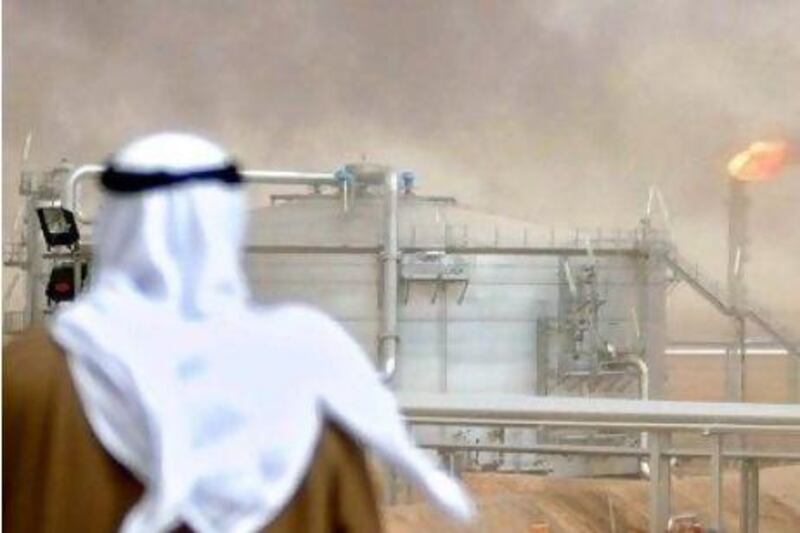KUWAIT CITY // The Kuwait Petroleum Corporation (KPC) is spearheading a US$340 billion (Dh1.24 trillion) investment master plan to transform the nation's energy policy.
In the next five years alone, state-owned KPC is due to spend $90bn on oil and gas projects, Hashim al Rifai, its managing director, told an oil and gas summit in the capital yesterday.
Over the company's latest 20-year planning period to 2030, that investment will "mushroom" to $340bn, said Mr al Rifai.
The state oil company is pursuing the aggressive capital programme to boost government revenues which, more than in any other GCC country, are derived from oil exports.
But to achieve that, Kuwait will not only need to invest in the expansion of its oil production and refining capacity, but also spend heavily on gas development. That is because it is seeking to eliminate the need to burn increasing volumes of fuel oil and crude in its power stations.
"Gas is becoming very critical for Kuwait," said Mohammad Hussain, the deputy chairman and deputy managing director for planning and gas at Kuwait Oil Company (KOC), the oil and gas production unit of KPC. "Also, environmental pressure is driving us to select gas for power generation. This has set the scene for an ambitious gas strategy to fulfil the country's energy needs.
"This is a massive undertaking," he continued. "We have been very much an oil organisation. The gas never was something in the front seat. Now we are trying to push for the energy side. … This is a new shift. It requires massive expansion of facilities."
KOC is aiming to increase Kuwait's gas output by almost 300 per cent over the next two decades, compared with a 25 per cent targeted increase in oil production capacity, said Mr Hussain. "We are hoping to reach 4 billion cubic feet per day [cfpd] by 2030, up from 1.2 billion cfpd."
Of the various challenges KOC and its parent must meet to achieve the gas production goal, Mr Hussain said developing a countrywide vision and strategy for natural gas was among the most important.
"We need to improve clarity and transparency to all stakeholders. There is a need for a KPC gas master plan," he said. "These combined actions will create a much clearer vision for gas and increase the involvement of all the stakeholders."
The gas programme would include producing more "associated gas" from Kuwait's oilfields as the emirate's oil output rises, and further reducing the amount of gas flared, or burnt off as waste; developing "difficult" gasfields in the north of Kuwait - deeply buried deposits that are heavily laced with toxic hydrogen sulphide; and developing gas reserves in the "divided zone" shared by Kuwait and Saudi Arabia.
Mr al Rifai said KPC was planning to lift oil output capacity to 3.5 million barrels per day (bpd) by 2015 and 4 million bpd by 2020, and to maintain it at 4 million bpd thereafter.
The company exceeded its oil development target last year, reaching a capacity of 3.2 million bpd instead of 3 million bpd, he said.
KPC also aimed to expand Kuwait's annual domestic refining capacity to 1.4 million bpd from about 950,000 bpd and was widening its global network of oil refining and petrochemical partnerships.
Before last year, KPC frequently fell short of its development targets because Kuwait's parliament often opposed major oil projects or spending plans - especially those involving foreign partners. One of the biggest blows came at the end of 2008, when the government cancelled a $17.4bn joint venture between KPC and the US chemical producer Dow.
Fractious relations between Kuwait's elected parliament and a government appointed by the emirate's ruler also hampered progress with Project Kuwait, the previous KPC master plan for boosting oil output capacity.
Kuwait's 16-member cabinet resigned last Thursday, causing uncertainty about when the new KPC oil plan might get under way.





